Three mentees pay homage to Sherna Gandhy, the legendary journalist and editor who passed into the ages on April 28 after a long battle with cancer.
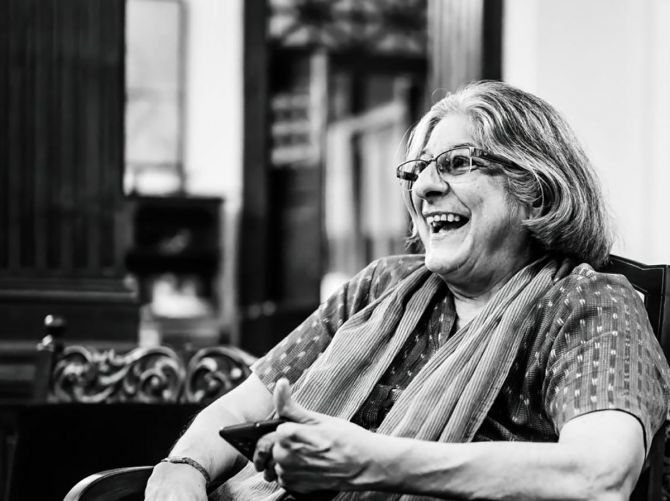
Meher Marfatia
She was godmother, guiding light, lode star. Just what a 21-year-old rookie writer like me could do with when I joined the venerated The Illustrated Weekly of India in 1985.
Subbing to perfection was hardly the sole skill Sherna Gandhy groomed hundreds of team members for, respecting her rigour of work in a dozen publications over five decades dedicated to print journalism.
A quiet powerhouse, incredibly understated considering the professional star she was, her intelligence, compassion, warmth and wit (often acerbic, always fair, never unkind) taught us much about life itself.
How to conduct oneself with utmost honesty, practicality, courage and compassion.
Leading by example, she showed the importance of picking battles. The wisdom to gauge when to brush off the inconsequential with a smile or shrug, think when to take up cudgels for a cause worth the purpose and passion.
I fully value this today -- navigating through situations rather than just railing against them.
Also, how to differ and argue justly, so that even the toughest nut to crack can end up respecting you, a quality admired by all the editors she took on.
Ten years my senior, perceptive and sharp, the no-nonsense and sensible soul she was, made her absolutely the best kind of confidante, offering ultimately sensible advice on matters both personal and journalistic.
She loved my parents, in-laws and children every bit as much as I do her family.
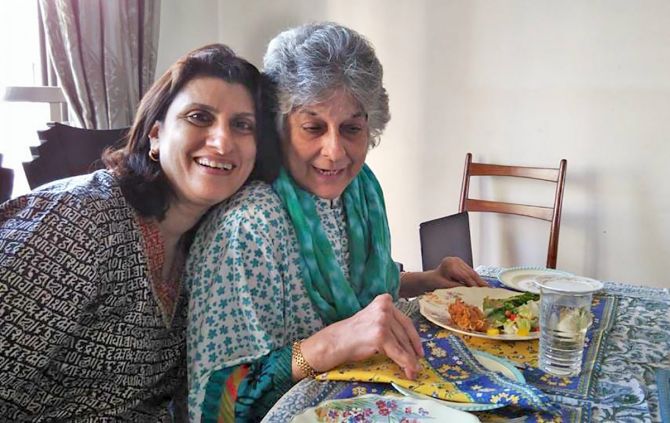
As I shared with her cousin, when I would wish Sherna on her April 16th birthday each year and told her how much of my life she impacted, she'd grin, saying with typical self-deprecation: "Oho, now enough Meher. I fear getting a swollen head and that's the last thing anyone should have!" Too true.
In a world invaded by shrill hyperbole and chest-thumping megalomania, she shone a muted light, visibly bright only to those lucky enough to have spent time with her. She refined the word 'low-key'.
And how she raged against the dying of the light -- combating cancer for eight years uncomplainingly, matter-of-factly, worrying for her family alone.
As I consoled some grieving colleagues, she'd scold us for moping, not carrying on joyfully with our lives.
We need to recount the good times shared together. Try to honour her brilliant legacy by continuing to write and edit following the exacting standards she set, which stand us in good stead.
Among all the abundance to offer gratitude for, I am deeply thankful for the privilege of knowing my beautiful, brave friend now gone gently in the good night.
***
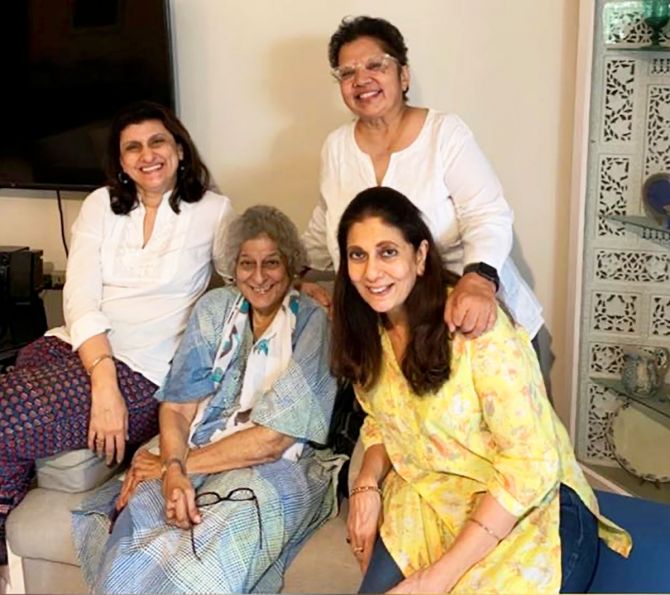
Minnie Vaid
There is no one in the Universe whose opinion I valued more than Sherna Gandhy's -- on both professional matters and personal decisions.
Last week all of that ended with the untimely death of my mentor, my friend, my trusted critic for 40 years.
A journalist/editor par excellence, who always called a spade a spade, never minced her (sometimes acerbic) words and a friend who stood by you forever if you were lucky enough to matter to her.
I was one of the lucky ones -- taught by her how to deliver flawlessly 'clean' copy at the Illustrated Weekly of India when I was a callow cub reporter/sub-editor in the early 1980s.
In fact, she made grammar Nazis of us all, for the rest of our lives. We'd gleefully point out errors made by subsequent editors and publishers and silently thank her for it.
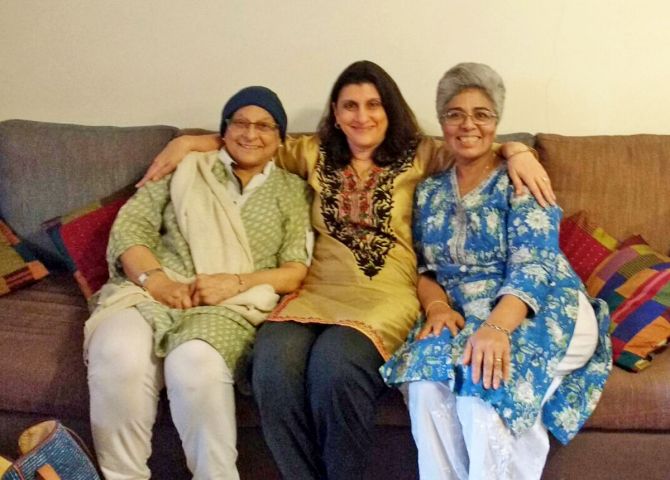
Three decades later, it was Sherna who steered my new career of writing non-fiction books with meticulous guidance and feedback, chapter by chapter of my first book on Dr Binayak Sen.
If I went overboard or veered off-track, she'd point it out in a trice, with detailed track changes in red -- I waited for these reverts with equal parts anticipation and jittery nerves.
If she liked bits in a chapter, it made my day, if she didn't, I'd get upset and get a scolding, "You know you don't have to take my feedback as gospel truth, don't you? Make your own decisions about what to keep and what to discard."
It is worth noting that the biggest criticism my first book faced (in public reviews no less) was exactly what Sherna had pointed out a year ago and what I had chosen to discard -- that the central character had elements of hero-worship.
Every book, every film had to pass the 'Sherna test' for me, she was generous with her time and attention, taking her responsibility as mentor seriously, decades after she quit being my boss and became an equally generous friend, showing up for film screenings and book launches even when she was battling serious health issues.
And it is this, far more than her professional skills, that I admire the most in my friend-- Sherna's incredible stoicism and uncomplaining courage in the last eight years of her battle with cancer.
In the many visits to her home and telephone calls that I exchanged with her, she never once said she was in pain or even mention the silent suffering she endured daily.
She'd answer, "Getting there" to my usual query of "Are you feeling better Sherna?"
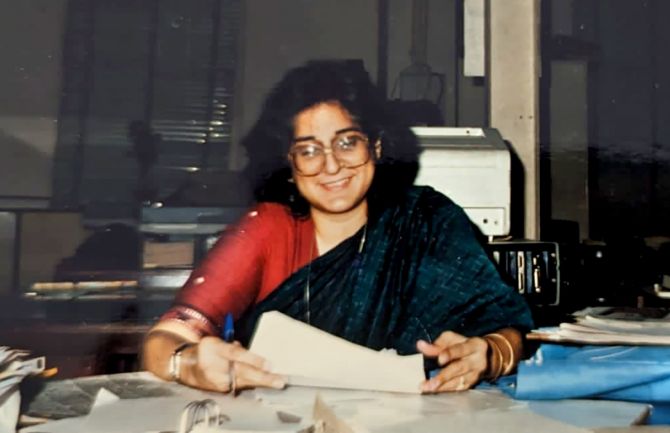
She preferred talking about current topics of interest, the state of the nation, the far-reaching impact of the political polarisation post 2014 on personal relationships, the pressing need for a push-back by each one of us instead of whining about how bad things were getting today.
The last visit of the Weekly gang to her home in the last week of December 2022 was precious and full of reminiscences and banter, prompting me to message her that I would visit her much more often, once a week if possible. Her immediate blunt reply -- "Once a week not necessary, once a month will do"!
Today I can clearly hear her voice admonishing me with her very own mix of affection-laced, straight talk -- "You're telling me you've been crying for three days? Just stop it at once. Get back to work."
I will Sherna, just as soon as I can figure out how to survive in a world without you.
***
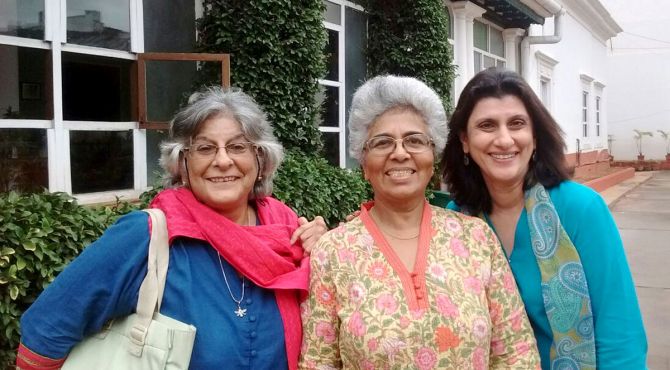
Payal Singh Mohanka
Sherna Gandhy leaves behind a collage of memories. She was the perfect boss who could sternly tick you off if you faltered or swamp with praise if deserved.
But most important was her gentle, loving, presence as she sat next to me at the Illustrated Weekly office in Mumbai.
I remember a day in 1987 when I went up to Sherna and said I had finished my pages, I needed to step out for lunch and may get a little late returning as I had some "personal matter" to attend to.
"Sure," said Sherna as she put the pages aside, leaned back, crossed her arms and with barely concealed amusement she said, "And what if I may ask, is this personal matter you have to attend to?"
When I very awkwardly told her I had received a proposal for marriage the previous evening and I had to meet the individual at the Bombay Gym, just behind our office, Sherna's face broke into a big smile, my awkwardness melted away as she said, "Of course, you must go!"
Over the years my husband Manoj too became a friend of Sherna's. And even after I moved to Kolkata, we remained in touch.
Years later when my publisher asked me to suggest an editor for my book, my first thought was Sherna and to my delight, she agreed. She was the best editor I knew.
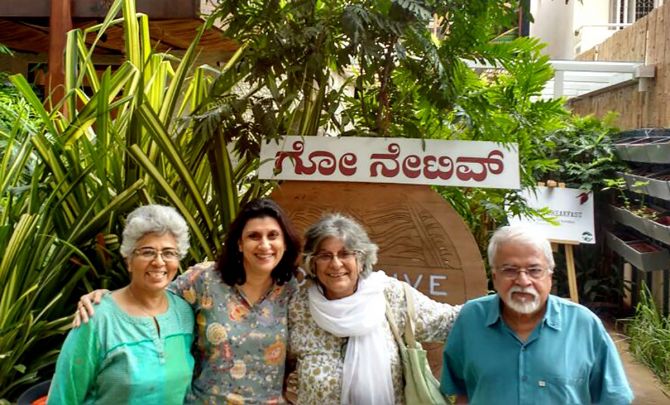
Last December I made a short trip to Bombay with the sole objective of spending time with Sherna.
A common friend had suggested I come and meet our dearest friend and former colleague while she was her usual cheerful self, even as she courageously combated cancer.
I am so glad I was able to meet her each day of my three-day trip to Mumbai.
We were transported back in time as the 'Weekly ladies' reminisced and enjoyed the hospitality of the Gandhy home.
Will always cherish memories of her warm presence, our animated conversations and her full-throated laughter. She hugely touched many lives including mine.
May God take special care of an exceptional human being!
All Photographs: Kind courtesy Meher Marfatia











 © 2025
© 2025